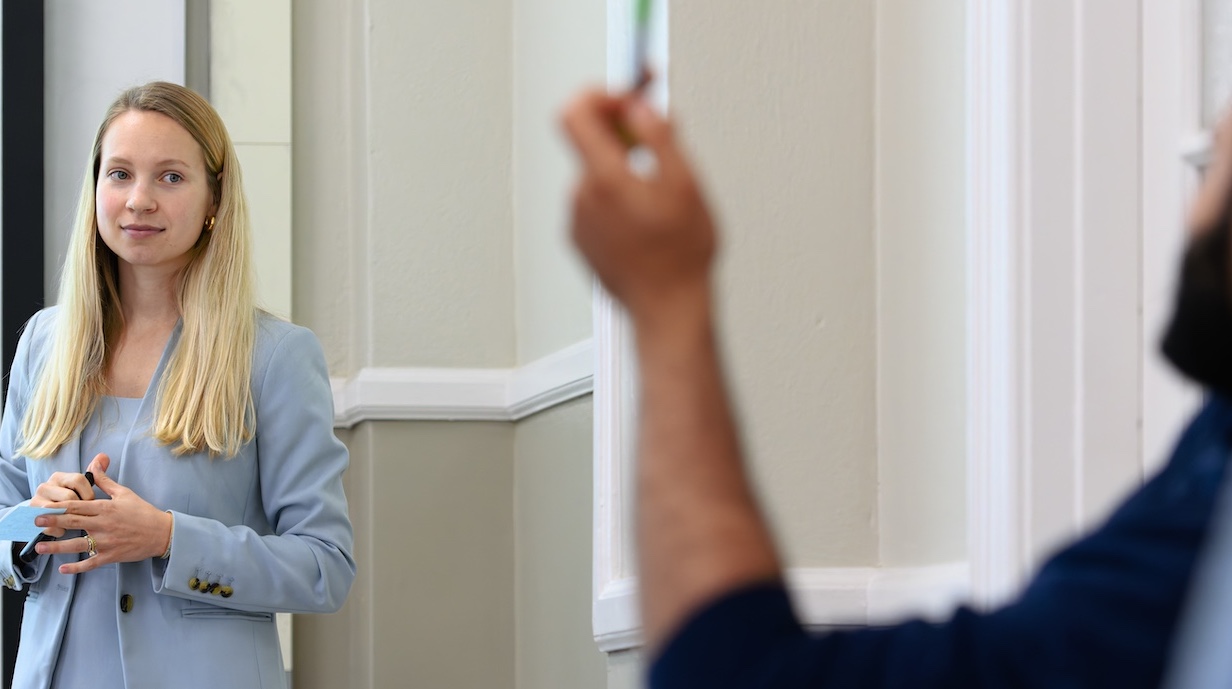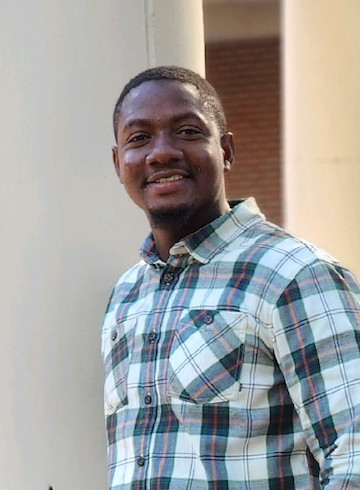Graduate Programs in Economics
Gain technical skills and advanced understanding of markets, government policy, and institutions to prepare for research careers in higher education, industry, or government.

“I chose the University of Mississippi for its opportunities to work closely with the econ faculty and the deep passion the community has for the university.”—Will Moffatt, Ph.D. student
Department of Economics
The University of Mississippi Department of Economics in the College of Liberal Arts offers two graduate degrees—the Master of Arts (M.A.) and the Doctor of Philosophy (Ph.D.)—designed to prepare students for careers in business, law, and government.
Graduate Program Coordinator
“Our department offers both doctoral and master-level degrees in economics. Our faculty specializes in a variety of fields, including Monetary Economics, Labor, Law & Economics, and Public Economics. Ph.D. students collaborate closely with the faculty on research and have the opportunity to get teaching experience starting their third year in the program. Most of our Ph.D. students go into academia, though some have also found success in both the private sector and government jobs.”
Ennio Piano
Assistant Professor of Economics
Program Information
Get the details on graduate degrees in Economics—how to apply, what classes you'll take, opportunities offered through graduate assistantships, and the research facilities available to you.
The Department of Economics welcomes student applications with the following materials.
- Complete the Graduate School’s Online Application.
- Pay the application fee ($60).
- Submit official transcripts.
- Submit GRE scores.
- International applicants whose first language is not English may be required to submit scores from an acceptable English language proficiency test.
- Upload Supplemental Application materials for the Department of Economics to the link provided on the online application.
- Statement of purpose: The two page statement should describe your background, interest in economics, and interest in the graduate program at the University of Mississippi. If you are NOT interested in financial support, please indicate this in your statement.
- Two letters of recommendation: provide contact information for two recommenders. Former professors are usually the best, as they know the expectations of graduate school, and they typically have first-hand knowledge of your academic abilities. Other possibilities are former employers or supervisors, or academic advisors. Ph.D. applicants need to submit 3 letters of recommendation. M.A. applicants need to submit 2 letters of recommendation.
The Graduate School requires a minimum 3.0 undergraduate GPA. The Department of Economics welcomes students from any academic background, but expects students to be prepared for the rigors of graduate study in economics. When the Admissions Committee reviews an applicant’s transcript, it looks at the overall performance and specific performance in economics or economics-related courses and quantitative courses (math, statistics).
The Mississippi Experimental Research Laboratory (MERL) is a computerized research facility used by faculty and graduate students to conduct a wide variety of economics research, including experimental economics, econometrics, and microeconomics. MERL has 24 subject workstation carrels equipped with a networked computer that is connected to the MERL fileserver and university’s internet. The lab also includes an observation room with a separate entrance.
The university also has the Mississippi Center for Supercomputing Research.
All our Ph.D. students receive an assistantship which are currently $30,000 for 9 months. Assistantships require the student to work as a teaching/research assistant to departmental faculty, or as a graduate instructor.
Students with a graduate assistantship receive a scholarship that covers some or all of the tuition and non-residency fee, if applicable, for regular semesters and subsidized health insurance.
In addition, the Lewis Smith Scholarship is awarded annually to a full-time Ph.D. student who has demonstrated outstanding academic achievement in economics.
The Graduate School’s financial aid webpage lists a variety of funding possibilities, including summer support and a recruiting fellowship program that promotes academic excellence and access to graduate education to groups who are historically underrepresented.
FAQ's
Common questions regarding the application process or about the department in general.
Learn more information about English language proficiency requirements and waivers.
All international applicants should visit the International Student and Scholar Services website. There is a plethora of useful information there, including information on International Admission criteria, cost of attending, visa requirements, etc.
Our program is designed to provide individualized attention. A typical lecture class has 5-8 students (graduate students in finance, accounting, etc. also take our courses). The typical Ph.D. student takes 5 years to finish, the typical M.A. student takes 2 years. Our graduate students usually number in the 15-20 range, across all years and both programs. Our entering class is about 4-6 students per year, Ph.D. and M.A. combined.
We do not have a stand-alone M.A. program; our M.A. and Ph.D. students take the same courses. There are three required course sequences (two courses each) in microeconomics, macroeconomics, and econometrics.
After three semesters, Ph.D. students must pass three written comprehensive exams to achieve candidacy and write a dissertation.
M.A. students are not required to take these exams. However, all M.A. students must pass an M.A. final comprehensive examination during the last enrollment period.
First Year: Prepare for Comprehensive Exams
Fall
Econ 607 Seminar
Econ 609 Math for Economists
Econ 629 Statistics for Economists
Econ 650 Research Colloquium in Economics (1 credit course)
Spring
Econ 605 Micro I
Econ 606 Macro I
Econ 630 Econometrics I
Econ 650 Research Colloquium in Economics (1 credit course)
Second Year: Prepare for Comprehensive Exams
Fall
Econ 614 Micro II
Econ 628 Macro II
Econ 631 Econometrics II
Econ 650 Research Colloquium in Economics (1 credit course)
Comprehensive Exams during winter break
Spring
Elective Courses
Econ 650 Research Colloquium in Economics (1 credit course)
Third Year: Write and Defend Dissertation Prospectus
Econ 797, Econ 650, and Elective Courses.
Fourth and Fifth Years: Write Dissertation and Prepare for Job Market.
Econ 797 and Econ 650; maybe Elective Courses.
Graduate Students
Economics graduate students come from around the world to study at the University of Mississippi.
| Name | Program | Office | ||
| Ahmed Adesete | Ph.D. | Odom 302 | aadesete@go.olemiss.edu | |
| David Agyeman-Duodu | Ph.D. | Odom 302 | dagyeman@go.olemiss.edu | |
| Gideon Appiah | Ph.D. | Odom 303 | gappiah@go.olemiss.edu | |
| Fouzia Awan | Ph.D. | Odom 302 | fawan@go.olemiss.edu | |
| Balikis Olawunmi Azeez | Ph.D. | Odom 303 | boazeez@go.olemiss.edu | |
| Randall Carter Campbell | Ph.D. | Odom 303 | rccampb1@go.olemiss.edu | |
| Juliet Fosua Dunyo | Ph.D. | Odom 303 | jfdunyo@go.olemiss.edu | |
| William Moffatt | Ph.D. | Odom 303 | wmoffatt@go.olemiss.edu | |
| Joseph Boyd Nation | Ph.D. | Odom 303 | jbnation@go.olemiss.edu | |
| Adedayo Ogunniran | Ph.D. | Odom 302 | aogunnir@go.olemiss.edu | |
| Martinson Opare | Ph.D. | Odom 303 | maopare@go.olemiss.edu | |
| Thilini Panamaldeniya Mudiyanselage | Ph.D. | Odom 303 | tsenanay@go.olemiss.edu | |
| Richmond Woblesseh | Ph.D. | Odom 303 | rwobless@go.olemiss.edu | |
| Liandong Yang | Ph.D. | Odom 302 | lyang3@go.olemiss.edu |
| Student | Fields of Specialization | |
| Agyeman-Duodu, David | Macroeconomics, Monetary Policy, Financial Frictions | Website |
| Awan, Fouzia Zafar | Macroeconomics, Growth, Development, Institutions | Website |
| Ogunniran, Adedayo | Public Finance, State Lotteries, Gambling | Website |
| Yang, Liandong | Macroeconomics, Fiscal Policy | Website |
Examples of economics graduate student theses/dissertations––
Essays on Monetary Policy and Financial Frictions, David Agyeman-Duodu
Essays on Institutions and Growth, Fouzia Zafar Awan
Essays on State Lotteries, Adedayo James Ogunniran
Essays on the Greek Debt Crisis and the Welfare Paradox in the Lucas Natural Rate Model, Liandong Yang
Essays on Labor Market Reform and The Quantity Theory of Money, Lawrence Ogbeifun
Empirical Essays in Law and Economics, Bright Addiyia Osei
Essays on Migration, Andreas Benjamin Vortisch

Why Study Economics at Ole Miss?
“I chose the economics department of the University of Mississippi due to its dedication to fostering academic growth and critical thinking. The department is very diversified which makes it an ideal environment for study especially as an international student. I am enjoying every bit of my journey here simply because the faculty are committed to what they are doing and also foster an all inclusive department.”
Richmond Woblesseh
Economics Ph.D. student
Job Placement
Economics graduates (M.A. and Ph.D.) take their knowledge and skills to jobs across the country and the world.
Principal Rate Analyst, Mississippi Power Company
Banker, Meridian Bank
Econometrics Consultant, American Express
Quantitative Operations Associate, Bank of America
VP, First National Bank
Analyst, Washington Mutual
VP of Compliance, Vining Sparks Asset Management
Analytics Consultant, Wells Fargo
Quantitative Associate, Wells Fargo
Analyst, First Tennessee, Inc
Analyst, Cavalry Portfolio Services
Analyst, Regions Bank
Chief Financial Officer, Tower Ventures
Financial Analyst, Bank of Hawaii
Senior Data Analyst and Modeler, Cavalry Portfolio Services
Senior Credit Risk Analyst, First Tennessee Bank
Model Development Analyst, Regions Financial Corp
Model Validation Manager, Ally
Data Scientist Senior Associate, JP Morgan Chase
President/CEO, Sterling Economic Development Consultants
Principal Data Science Consultant, Walmart
Actuarial Assistant, Arch Insurance
Sales Service Representative, Cintas Corporation
Supply Chain Analyst, Dillards
Faculty unless otherwise noted––
Jackson State University
The Ohio State University
Kalamazoo College
East Tennessee State University
Western Washington University
Black Hills State University
Augustana College
Austin Peay State University
University of Mississippi
Hartwick College
Bethel University
Wofford College
Collegiate University
Virginia Military Institute
Georgia Southern University
Miami University
Kalamazoo College
University of Central Arkansas
Western Illinois University
Argosy University
University of Southern Mississippi
University of Pittsburgh
SUNY – Geneseo
SUNY-Canton
Northern Illinois University
George Mason University
Dean, Delta State University
VP for Academic Affairs at St. Mary’s University
Senior Accountant, Shelby County Schools
Director of Office of Research and Analytics, Mississippi Department of Education
Fiscal and Policy Analyst, Iowa Department of Revenue
Data Scientist, Mississippi Department of Education
Econometrics Analyst, International Data Group
Research Statistician, Hawaii Department of Labor and Industrial Relations
Associate Research Fellow, Korea Institute of Local Finance
Senior Power Trader, Tennessee Valley Authority
Economist, Tennessee Valley Authority
